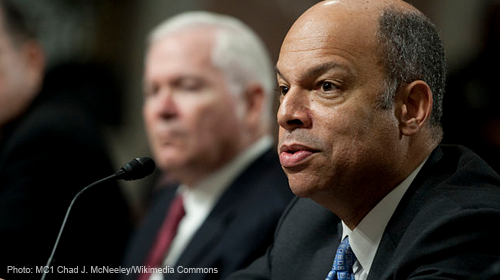
This week, Department of Homeland Security (DHS) Secretary Jeh Johnson is busy testifying before four different congressional committees on the President’s FY 2015 DHS budget request.
In these hearings, Congress must demand answers from the Administration – and newly appointed Secretary Johnson – about the proposed budget and his vision for the Department’s future, especially as it concerns immigration.
Here are some key questions:
When will U.S. Customs and Border Protection (CBP) reform its use of force policy?
Since 2005, the actions of on-duty CBP officers and agents have led to the deaths of at least 44 people—prompting Members of Congress to call for investigations into the agency’s use of force policy. When the Police Executive Research Forum completed its independent investigation last year, however, CBP buried the results by refusing to release the report—even to Members of Congress—and publicly rejecting two of the report’s key recommendations. And, last week’s new use of force directive to CBP personnel does little to actually update or improve on existing policy. Congress should demand more of an agency that has requested a whopping $13 billion dollars in funding next year.
How will DHS fix its broken complaint system and address civil rights violations?
Got a problem with DHS enforcement activities? Just try to figure out who to call. The current system for filing complaints with DHS is broken at every stage, making it extremely difficult for those whose rights are violated to get answers. Even individuals who successfully file complaints often wait years for a response. In addition to the inadequate complaint infrastructure throughout DHS, years of limited funding for the DHS Office of Civil Rights and Civil Liberties (CRCL), the office tasked with investigating and resolving civil liberties complaints filed by the public, have also resulted in diminished capacity to actually address concerns. This year’s budget request includes $22 million in funding for CRCL—a minor increase from last year—but Congress and DHS could demonstrate their commitment to improving oversight at the Department by giving CRCL the resources it really needs to address complaints, and by investing in a complete overhaul of the complaint process to make it more transparent and responsive to the public.
How does DHS plan to end the arbitrary, costly detention bed quota?
DHS has taken a step forward by requesting funding for fewer immigration detention beds this year—30,539 compared to the 34,000 mandated by Congress in last year’s budget—and asserting that the numbers of beds it maintains should be based on actual need, not on a Congressionally- imposed quota. Ending the quota is a concept supported by rational thought and also by many Members of Congress and 136 civil rights, civil liberties, human rights, legal services, and faith-based organizations. At $161 per bed, per night, immigration detention currently costs taxpayers over $5 million per day and nearly $2 billion per year—even though much cheaper, effective alternatives to detention (ATDs) are readily available – and used in criminal justice jurisdictions across the country. Congress should give DHS the flexibility to use them.
Why is DHS requesting funds to continue record-level deportations of aspiring American citizens?
Finally, although President Obama’s budget expresses support for immigration reform with a pathway to citizenship for those without status, it also continues to fund programs that detain and deport these very same people at unprecedented rates. The administration requests a total of $2.6 billion for ICE Enforcement and Removal Operations. It also requests $24 million for ICE’s failed 287(g) program, which deputizes local and state law-enforcement officials to enforce federal immigration laws, even though the program is obsolete and fosters discriminatory policing.
Congress has the responsibility to ask whether the DHS programs we’re spending so much on are consistent with our priorities as a nation. This week, Secretary Johnson has the opportunity to say no – and propose a new way forward.
Learn more about immigration reform and other civil liberty issues: Sign up for breaking news alerts, follow us on Twitter, and like us on Facebook.




